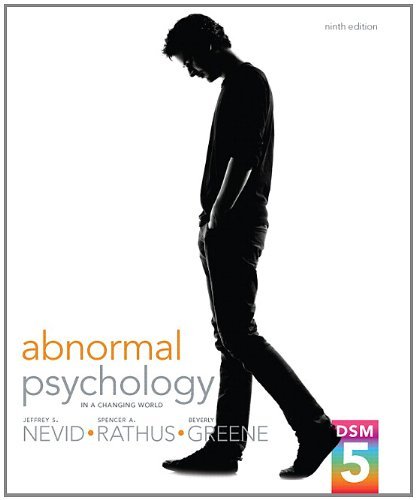Instant download Abnormal Psychology in a Changing World Nevid 9th Edition Test Bank pdf docx epub after payment.

Product details:
- ISBN-10 : 0205962300
- ISBN-13 : 978-0205962303
- Author: Nevid; Spencer A. Rathus
Puts a human face on the study of Abnormal Psychology, now with DSM-5 coverage throughout.
Abnormal Psychology in a Changing World, 9/e uses first-person narratives from people struggling with psychological disorders as a pedagogical framework. Updated to reflect the revision of the Diagnostic and Statistical Manual (DSM-5), the authors endeavor to bring research developments and advancements in abnormal psychology to students. Through illustrative case examples drawn from the authors’ own experiences, they recognize there is a human dimension to the study of abnormal psychology.
The 9 edition includes coverage of the Diagnostic and Statistical Manual (DSM-5), with updated text references and examples throughout.
Table Of Contents:
hapter 1 Introduction and Methods of Research How Do We Define Abnormal Behavior? Criteria for Determining Abnormality Cultural Bases of Abnormal Behavior Historical Perspectives on Abnormal Behavior The Demonological Model Origins of the Medical Model: In ¿Ill Humor¿ Medieval Times Witchcraft Asylums The Reform Movement and Moral Therapy A Step Backward The Community Mental Health Movement: The Exodus from State Hospitals Contemporary Perspectives on Abnormal Behavior Research Methods in Abnormal Psychology Description, Explanation, Prediction, and Control: The Objectives of Science The Scientific Method Ethics in Research Naturalistic-Observation The Correlational Method The Experimental Method Epidemiological Studies Kinship Studies Case Studies Summing Up Chapter 2 Contemporary Perspectives on Abnormal Behavior THE BIOLOGICAL PERSPECTIVE 38¿44 The Nervous System Evaluating Biological Perspectives on Abnormal Behavior THE PSYCHOLOGICAL PERSPECTIVE 44¿60 Psychodynamic Models Learning Models Humanistic Models Cognitive Models THE SOCIOCULTURAL PERSPECTIVE 60¿63 Ethnicity and Mental Health Evaluating the Sociocultural Perspective THE BIOPSYCHOSOCIAL PERSPECTIVE 63¿66 The Diathesis¿Stress Model Evaluating the Biopsychosocial Perspective The Case of Jessica¿A Final Word SUMMING UP 66 Chapter 3 Classification and Assessment of Abnormal Behavior HOW ARE ABNORMAL BEHAVIOR PATTERNS CLASSIFIED? 70¿77 The DSM and Models of Abnormal Behavior STANDARDS OF ASSESSMENT 77¿78 Reliability Validity METHODS OF ASSESSMENT 78¿97 The Clinical Interview Psychological Tests Neuropsychological Assessment Behavioral Assessment Cognitive Assessment Physiological Measurement SOCIOCULTURAL AND ETHNIC FACTORS IN ASSESSMENT 97¿98 SUMMING UP 98¿99 Chapter 4 Methods of Treatment TYPES OF HELPING PROFESSIONALS 102 PSYCHOTHERAPY 102¿122 Psychodynamic Therapy Behavior Therapy Humanistic Therapy Cognitive Therapy Cognitive¿Behavioral Therapy Eclectic Therapy Group, Family, and Couple Therapy Evaluating Methods of Psychotherapy Multicultural Issues in Psychotherapy BIOMEDICAL THERAPIES 122¿127 Drug Therapy Electroconvulsive Therapy Psychosurgery Evaluation of Biological Approaches HOSPITALIZATION AND COMMUNITY-BASED CARE 127¿134 Roles for Hospitalization The Community Mental Health Center Ethnic Group Differences in Use of Mental Health Services Racial Stereotyping and the Mental Health System Evaluation of Deinstitutionalization SUMMING UP 134¿135 Chapter 5 Stress, Psychological Factors, and Health ADJUSTMENT DISORDERS 138¿139 STRESS AND ILLNESS 139¿153 Stress and the Endocrine System Stress and the Immune System Terrorism-Related Trauma The General Adaptation Syndrome Stress and Life Changes Acculturative Stress: Making It in America Psychological Factors That Moderate Stress PSYCHOLOGICAL FACTORS AND PHYSICAL DISORDERS 153¿165 Headaches Cardiovascular Disease Asthma Cancer Acquired Immunodeficiency Syndrome (AIDS) SUMMING UP 165¿166 Chapter 6 Anxiety Disorders HISTORICAL PERSPECTIVES ON ANXIETY DISORDERS 170¿171 PANIC DISORDER 172¿177 Theoretical Perspectives Treatment Approaches PHOBIC DISORDERS 178¿191 Types of Phobias Theoretical Perspectives Treatment Approaches OBSESSIVE¿COMPULSIVE DISORDER 192¿196 Theoretical Perspectives Treatment Approaches GENERALIZED ANXIETY DISORDER 196¿198 Theoretical Perspectives Treatment Approaches ACUTE STRESS DISORDER AND POSTTRAUMATIC STRESS DISORDER 198¿202 Features of ASD and PTSD Theoretical Perspectives Treatment Approaches ETHNIC DIFFERENCES IN ANXIETY DISORDERS 203¿204 TYING IT TOGETHER 205 SUMMING UP 205¿207 Chapter 7 Dissociative and Somatoform Disorders DISSOCIATIVE DISORDERS 210¿224 Dissociative Identity Disorder Dissociative Amnesia Dissociative Fugue Depersonalization Disorder Culture-Bound Dissociative Syndromes Theoretical Perspectives Treatment of Dissociative Disorders Tying It Together SOMATOFORM DISORDERS 224¿237 Conversion Disorder Hypochondriasis Body Dysmorphic Disorder Pain Disorder Somatization Disorder Koro and Dhat Syndromes: Far Eastern Somatoform Disorders? Theoretical Perspectives Treatment of Somatoform Disorders SUMMING UP 238¿239 Chapter 8 Mood Disorders and Suicide TYPES OF MOOD DISORDERS 242¿254 Major Depressive Disorder Dysthymic Disorder Bipolar Disorder Cyclothymic Disorder CAUSAL FACTORS IN DEPRESSIVE DISORDERS 254¿268 Psychodynamic Theories Humanistic Theories Learning Theories Cognitive Theories Biological Factors CAUSAL FACTORS IN BIPOLAR DISORDERS 000-000 TREATMENT OF MOOD DISORDERS 268¿275 Treating Depression Treating Bipolar Disorder TYING IT TOGETHER 000-000 SUICIDE 275¿283 Who Commits Suicide? Why Do People Commit Suicide? Theoretical Perspectives on Suicide SUICIDE 275¿283 Who Commits Suicide? Why Do People Commit Suicide? Theoretical Perspectives on Suicide Predicting Suicide SUMMING UP 283¿284 Chapter 9 Substance Abuse and Dependence CLASSIFICATION OF SUBSTANCE-RELATED DISORDERS 287¿293 Substance Abuse and Dependence Addiction, Physiological Dependence, and Psychological Dependence Racial and Ethnic Differences in Substance Dependence Pathways to Drug Dependence DRUGS OF ABUSE 293¿309 Depressants Stimulants Hallucinogens THEORETICAL PERSPECTIVES 309¿316 Biological Perspectives Learning Perspectives Cognitive Perspectives Psychodynamic Perspectives Sociocultural Perspectives TREATMENT OF SUBSTANCE ABUSE AND DEPENDENCE 317¿326 Biological Approaches Culturally Sensitive Treatment of Alcoholism Nonprofessional Support Groups Residential Approaches Psychodynamic Approaches Behavioral Approaches Relapse-Prevention Training Tying It Together SUMMING UP 328 Chapter 10 Eating Disorders, Obesity, and Sleep Disorders EATING DISORDERS 331¿344 Anorexia Nervosa Bulimia Nervosa Causes of Anorexia and Bulimia Treatment of Anorexia Nervosa and Bulimia Nervosa Binge-Eating Disorder Tying it Together SLEEP DISORDERS 351¿361 Dyssomnias Parasomnias Treatment of Sleep Disorders SUMMING UP 362
People also search:
|
how has abnormal psychology changed over time |





